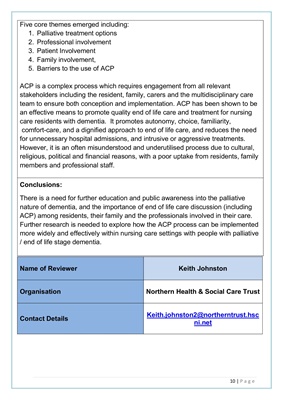
10 | P a g e
Five core themes emerged including:
1. Palliative treatment options
2. Professional involvement
3. Patient Involvement
4. Family involvement,
5. Barriers to the use of ACP
ACP is a complex process which requires engagement from all relevant
stakeholders including the resident, family, carers and the multidisciplinary care
team to ensure both conception and implementation. ACP has been shown to be
an effective means to promote quality end of life care and treatment for nursing
care residents with dementia. It promotes autonomy, choice, familiarity,
comfort-care, and a dignified approach to end of life care, and reduces the need
for unnecessary hospital admissions, and intrusive or aggressive treatments.
However, it is an often misunderstood and underutilised process due to cultural,
religious, political and financial reasons, with a poor uptake from residents, family
members and professional staff.
Conclusions:
There is a need for further education and public awareness into the palliative
nature of dementia, and the importance of end of life care discussion (including
ACP) among residents, their family and the professionals involved in their care.
Further research is needed to explore how the ACP process can be implemented
more widely and effectively within nursing care settings with people with palliative
/ end of life stage dementia.
Name of Reviewer
Keith Johnston
Organisation
Northern Health & Social Care Trust
Contact Details
keith.johnston2@northerntrust.hsc
ni.net